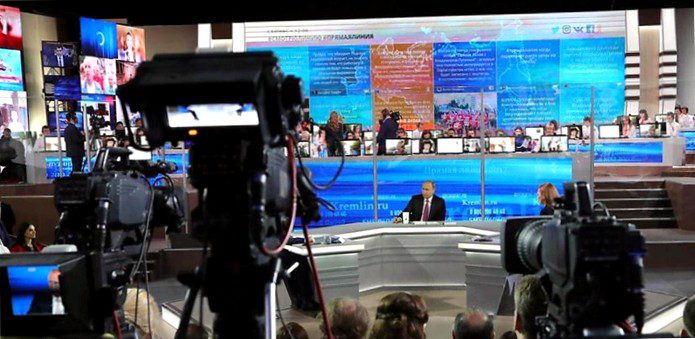No ban on Russian state broadcasters

The Federal Council decided at an extraordinary meeting on Friday not to impose a ban on the distribution of Russian state media in Switzerland. In the EU, such a ban is in force. (Archive image) Photo: KEYSTONE/EPA SPUTNIK POOL/MICHAEL KLIMENTYEV / SPUTNIK / K / POOL
Ukraine – The Federal Council adopts further EU sanctions against Russia, as it decided on Friday at an extraordinary meeting. However, the state government does not want to know anything about banning the distribution of Russian state media.
The EU had already banned the distribution of Russian state media at all levels – including cable, satellite, websites or apps – in early March. Also affected are offshoots of "RT" (formerly: "Russia Today"), for example in German or French. The ban will be implemented by the media regulators of the EU states. Banning media is generally a serious interference with freedom of expression and information.
The Federal Council now decided not to implement the measure, as it announced. "Even if these channels are tools of targeted propaganda and disinformation by the Russian Federation, the Federal Council believes that it is more effective to counter untrue and harmful statements with facts, rather than banning them."
Swisscom and Sunrise UPC had already decided at the beginning of March to stop broadcasting the Russian state channel "RT" with immediate effect and until further notice due to the extraordinary situation. "Sputnik" will not be broadcast on either provider.
"Very sensitive political issue"
In an interview with Tamedia newspapers on Friday, Economy Minister Guy Parmelin called a Switzerland-wide ban on the distribution of Russian state broadcasters in Switzerland a "very sensitive political issue". A ban can only be justified if Switzerland's higher-ranking interests are really at stake.
The two channels "RT" and "Sputnik" are "instruments of Russian propaganda and warfare," Parmelin continued. "They spread lies and disinformation with the aim of fomenting insecurity and using the freedom of our democracies against Switzerland."
But a ban could be interpreted as censorship, according to Parmelin. He also wondered whether a ban would not make these channels more attractive. In any case, the population is in a position to judge what is "absurd propaganda" and what is not, Parmelin said.
Fourth sanctions package implemented
In principle, the Federal Council has decided that Switzerland will adopt all EU sanctions measures against Russia. However, the state government wants to take a close look at every takeover.
In light of the ongoing military invasion of Ukraine, the Federal Council adopted further sanctions against Russia on Friday. They come into force on Friday night at 11 p.m. "Thus, all measures on the EU's fourth sanctions package have been implemented," the government wrote.
Already last week, Switzerland had implemented the extensions of the list of persons affected by financial sanctions decided by the EU by then. The export of goods for the energy sector and related services are newly prohibited. Also prohibited are investments and provision of loans or other funding to companies operating in the energy sector.
No more luxury watches for Russia
Imports of iron and steel products from or originating in Russia will also be halted. In addition, exports to Russia of luxury goods and goods for maritime navigation are no longer possible. In the financial sector, transactions with certain state-owned companies and the provision of rating services will be banned.
Finally, the Federal Council decided on certain exemptions from financial sanctions for humanitarian purposes. This facilitates business relations that are necessary for the work of humanitarian organizations.